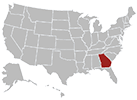
If you want to help people feel better and get back to doing the things they love, becoming a physical therapy assistant (PTA) is a great career choice.
In this guide, I’ll walk you through what it takes to work as a PTA in Georgia.
You’ll learn about the education, exams, and licenses you need.
I’ll also share details on PTA programs around the state of Georgia and what you can expect to earn.
Stick with me, and by the end, you’ll be ready to start your path to becoming a PTA!
Page Navigation
How to Become a Physical Therapist Assistant in Georgia – Step by Step
The first step is getting your associate’s degree from an approved PTA program.
These take about two years to complete.
Classes will likely include anatomy, physiology, and learning hands-on techniques to help patients.
You’ll practice positioning, range of motion exercises, balance activities, and therapeutic massage. Expect to spend time in various clinical settings as well.
Clinical experiences are a key part of PTA education.
During your first year, observations introduce you to different work environments and patient populations.
In the second year, full-time clinical affiliations immerse you in the day-to-day responsibilities of a practicing PTA under a licensed therapist’s supervision.
This hands-on training is invaluable for applying what you learned in the classroom.
After school, you’ll need to pass the National Physical Therapy Exam for PTAs.
This comprehensive exam tests the full scope of what you learned throughout your PTA program classes.
The exam covers topics like pathologies, interventions, and safety procedures.
In addition to the national exam, Georgia also requires state licensure to practice.
This involves some post-grad requirements like completing a licensure application, fingerprinting for a background check, and paying fees.
Maintaining an active license also means accumulating continuing competency units each renewal period through activities like attending conferences or taking more courses.
It’s important to keep up with changes in the field, as physical therapy is always improving to help more patients.
Physical Therapist Assistant Schools in Georgia
There are a few great schools right here in Georgia where you can get your PTA training.
Here are a few top options, with some details on costs and schedules:
Albany State University
- Located in Albany, GA
- Requires prerequisites of biology, algebra, and psychology before applying
- Accepts about 20 students each year into the cohort program
- Includes classroom and clinical training components
- Graduates are eligible to take the PTA licensing exam
Athens Technical College
- Located in Athens, GA
- The cohort size is typically around 25 students
- Includes both didactic and hands-on clinical portions
- Upon graduation, students qualify to sit for the PTA licensing examination
Atlanta Technical College
- Located in Atlanta, GA
- Prerequisites are biology, algebra, anatomy, and physiology
- Accepts 25-30 students per year into the program starting each fall
- Consists of classroom learning as well as clinical experiences in various settings
- The program is structured part-time over 5 semesters to ease the course load
- Graduates are eligible to apply for PTA licensure through the state licensing board
Intending to prepare students to become licensed physical therapist assistants, all three of these programs have earned accreditation from the Commission on Accreditation in Physical Therapy Education (CAPTE).
The different lengths and costs provide options depending on location and budget.
Top 3 Schools in Georgia
| School Name | Address |
|---|---|
| Albany State University | 504 College Dr, Albany, GA 31705, United States |
| Athens Technical College | 800 US-29, Athens, GA 30601, United States |
| Atlanta Technical College | 1560 Metropolitan Pkwy SW, Atlanta, GA 30310, United States |
Salary Expectations in Georgia
With the skills you’ll gain as a PTA, you can look forward to making a good living.
According to the most recent numbers, the average yearly salary for a PTA in Georgia is $52,000.
Several factors can affect your exact income, though.
More experienced PTAs tend to earn more.
Also, salaries may vary depending on your employer – some places, like hospitals, typically pay more than private practices.
Plus, this salary has great earning potential for growth.
Many PTAs choose to further their education with a Master’s in Physical Therapy to become physical therapists (PTs).
PTs command an average salary of around $87,000 in Georgia.
Between a solid starting wage and the opportunity to advance your career, becoming a PTA provides both financial stability and professional satisfaction.
Annual Salary Range:Average Salary of Physical Therapist Assistants in Georgia
| City Name | Salary |
|---|---|
| Atlanta | $34,600 |
| Augusta | $33,000 |
| Columbus | $32,100 |
| Savannah | $33,100 |
| Athens | $34,400 |
| Macon | $32,800 |
| Roswell | $34,500 |
| Albany | $32,400 |
| Marietta | $34,500 |
| Valdosta | $31,600 |
Regional Salary in Georgia
| Region | Employed | Avg. Annual Salary | Avg. Hourly Pay | Top 10% Annual Salary | Bottom 10% Annual Salary |
|---|---|---|---|---|---|
| Albany, GA | 50 | $68,850 | $33.1 | $79,880 | $60,990 |
| Athens-Clarke County, GA | 70 | $76,480 | $36.77 | $94,070 | $54,900 |
| Atlanta-Sandy Springs-Roswell, GA | 1,170 | $73,770 | $35.47 | $94,810 | $56,390 |
| Augusta-Richmond County, GA-SC | 140 | $70,370 | $33.83 | $87,240 | $51,680 |
| Columbus, GA-AL | 80 | $64,590 | $31.05 | $86,690 | $33,570 |
| Gainesville, GA | 50 | $65,920 | $31.69 | $82,060 | $33,590 |
| Macon, GA | 100 | $61,040 | $29.35 | $79,470 | $31,080 |
| Rome, GA | 60 | $68,480 | $32.92 | $88,190 | $50,470 |
| Savannah, GA | 120 | $69,520 | $33.43 | $85,730 | $50,500 |
| Valdosta, GA | 40 | $62,640 | $30.11 | $75,280 | $29,740 |
| Warner Robins, GA | 80 | $62,410 | $30 | $83,380 | $30,590 |
* Employment conditions in your area may vary.
Frequently Asked Questions
Do I need to be a Georgia resident to apply to these programs?
While priority is given to Georgia residents, Albany State University and Atlanta Technical College will accept out-of-state applications as well.
For non-residents, tuition and fees will be higher than the listed in-state estimates.
Athens Technical College accepts only Georgia residents due to limited space.
What are the admission requirements for these programs?
All three programs require a high school diploma or GED, completion of prerequisite courses with a minimum grade, an eligible college GPA, and an application with a personal statement and references.
Specific requirements, like exam scores and hours of observation, may vary by school.
It’s important to check each website for full criteria.
Are there jobs available for PTAs in Georgia once I graduate?
Yes, the physical therapy field is expected to grow significantly in Georgia through 2028.
New PTAs are needed to keep up with demand from an aging population and those with chronic conditions.
Recent graduates from these accredited programs should have good opportunities to find employment in settings like private practices, hospitals, skilled nursing facilities, and outpatient clinics around the state.
Can I work as a PTA while still in the program?
Some programs allow students to gain patient care experience through part-time jobs or volunteer positions during clinical affiliations.
However, most prohibit outside employment until after graduation for liability and commitment reasons.
It’s best to check a program’s policies and focus on your coursework during the intense 2-year timeline.
What are some other career advancement opportunities after becoming a PTA?
While many PTAs have long, fulfilling careers providing hands-on care, they may choose to advance in other ways as well.
Some options include obtaining an additional specialty certification in an area like pediatrics or wound care.
They could also become clinical instructors, supervising PTA students during affiliations.
With management experience, a PTA could ultimately become a practice administrator or director of rehabilitation services at a facility.
Earning a bachelor’s or master’s opens doors to roles like treatment coordinator, researcher, or sales representative.




